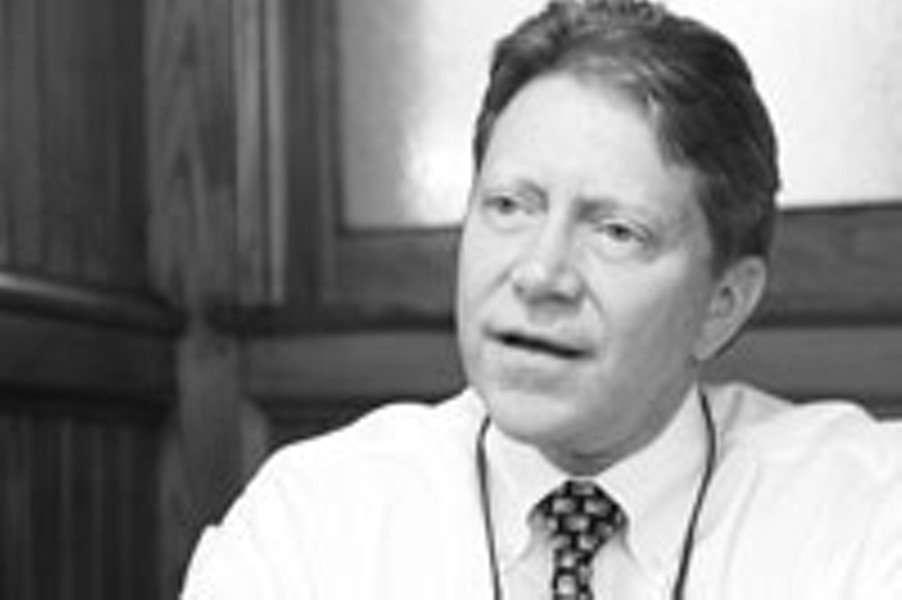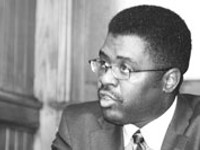The mayor and the schools
City: Given the city's fiscal challenges, would you favor more city funding for the CitySchool District?
Mains: My goal is to make sure the schools work. It is clear to me that the schools need more money than they receive today to function at the level they need to be. But it is going to be hard to get more money from the city. My goal is to get it from the state. The state is the only legitimate source. I'm not opposed to giving more funds, but realistically, it is going to be hard to increase funds from the city.
Would you favor having the superintendent report to the mayor?
What for? Really, I mean, what for? Yes, it has taken place in other city school districts, but it is not producing any better results. There are too many enormous problems facing the city.
And school reform does not happen at the district level. It must be approached on a school-by-school basis. One major concern that I have with this discussion is that it points people to the wrong place. We need to be looking at individual schools, and asking: Do they have the best leadership? Are the principals being supported in their schools? Do they have the best staff and do they have sufficient resources to do the things that are required of them? Are the kids entering school ready to learn?
I believe Manny [school superintendent Rivera] gets this. He is doing a fine job. He recognizes that reform happens at the school level. He is trying to move to more decision-making happening at the building level. And, his "wrap-around" piece [what Rivera calls "The Children's Zone'] is excellent, and that's what the mayor can do and should be doing in partnership with the school system.
I can impact what is happening outside the buildings that is influencing what is happening inside. I have developed a program called the Rochester Children's Initiative that concentrates on those things that are happening outside the school for children from the time they are born to the time they enter school. Manny can pick it up once they get there.
I think if you want to call yourself the Education Mayor, you should know something about education. The fact is, 8 out of the 14 reasons inner-city students do not perform as well as their suburban counterparts are in place before the child even enters school. Poor nutrition, lead paint poisoning, not being read to, not being spoken to -- those kinds of factors. The average child entering kindergarten at my school, School 50, has a working vocabulary of 200 words. The average child entering kindergarten at the Greece school that I left was 10 times as much, with 2000 words.
Are you satisfied with the financial reporting that the school district provides to City Hall? If not, what would you change?
It is troubling when people misconstrue the financial reporting criticisms into a mismanagement of funds. It's not a fair criticism. This year the district's budget met most of its reporting objectives set forth by City Hall. The last five years, it has run mostly in the black despite some huge curve balls thrown at the district at the last minute, like the most recent one with the school nurses being ripped from the buildings, and being expected to find the funding on their own.
But consistency is key to reporting. The problem was we have so many different departments with different systems. One department starts a program with a budget, then it gets transferred the next year to a different department, so it is difficult, and the result was confusion. But I think the district is very close to meeting all of the major reporting concerns for City Hall. I was one of the first people to push for consistency in reporting some 12 years ago as finance chair.
From a management perspective, what is the district doing well?
The district has worked very hard to get top-quality leadership. A crummy principal can take a building down in no time. You need strong leaders in every school, and since there has been a lot of turnover, and reform happens at the school level, this is what I am far more concerned about -- getting high-caliber folks in the buildings, not as important at the central office. Second, the district's intervention at the early level on literacy, Manny's Children's Zone --- these are major things that the district is doing exceptionally well.
Not doing well?
We are not always giving people enough time to absorb new systems or give feedback on what is working well and what needs refinement. Last year, we implemented a brand new report card. Great concept. A lot of schools are moving to standard-based report cards. Instead of one grade for reading there could be two or three, with recommendations for the student on what may need improvement. But it takes time for teachers to fully understand the difference in grading, and I think we all could have used more time to look at the criteria better.
Money problems
Rochester gets a disproportionately smaller amount of state aid than Buffalo and some other cities. What is the reason? And what would you do to correct that?
Two things: Albany operates in crisis mode, and they are more likely to run and throw more buckets of money on the fire. So if you are in a serious crisis, you are more likely to get the assistance. Second, our state delegation doesn't play the game as well as other delegations. I think you need to have a group that is very tight and very focused on what they need.
Even though we have been saying for years that the Performing Arts Center is a top priority, we haven't been able to get a consensus between the city and the county that said to the state that yes, we absolutely need this, this is where it going to go, and this is what it will look like. The needs in this community are great, but our ability to express to the state what they are, with everyone pushing in the same direction to get it done, has not always been there.
What consolidations, if any, would you advocate among the city and other area governments?
The estimates in savings are anywhere from 30 to 70 percent, but here is what I've learned in 14 years. People don't like consolidation. People become naturally entrenched and protective of their territories. Now there is a cloud over consolidation called "metro-government," because like it or not, Jack Doyle did everything he could to demonize metro government, making the concept seem scary. So instead of talking to people about metro government, talk to people about how can we do things more efficiently to save us all some money.
Would you support a merger of the city and county water authorities?
I'm open to looking at any option. But the city's water system is one of its most important assets. It pumps over $6 million into the city's funds, and it's one of the biggest capital assets the city has. So I don't want to lose my income stream and lower my bond rating in the process of consolidating.
Would you support merging the city and county economic development departments?
I would consider it, but it is not a unilateral move. I would make sure that people in various departments of both governments understand that Tim Mains will be talking to them about working together on a continuum. Not just once in a while. Communication and consistent contact will uncover the areas where we can consolidate for greater efficiency. I believe there is concrete savings to be found by just communicating along a continuum. A place where we could save a tremendous amount of dollars is in the public safety areas, but we put the idea of metro police to voters and it failed. The overall public safety budget is over a third of the annual budget. It's a critical piece. It's a huge expenditure for all of us.
It will become increasingly difficult for the city to have a balanced budget. Specifically what steps would you take to deal with the budget constraints?
The bottom line is, unless we grow our tax base, we are never going to get out of the trap. I am more for looking at ways to grow the pie than cutting to fit the budget and still meet critical needs. Just as I want to free our citizens from poverty, I want to free our city from financial constraints. I have looked at the projections for future income and it is pretty stagnant. My Pioneer Tax Rate I think is probably the boldest idea in the race. Basically, the current two-tiered property-tax structure discourages commercial investment. My Pioneer Tax Rate will reward investment, create jobs and build a broader tax base because properties that were either vacant or underutilized can be rehabilitated and added to the tax base, creating more revenue. [Mains' Pioneer plan would give tax breaks to commercial property owners who made large investments in their properties.]
What do you predict will happen to the city's finances in your first term?
There may be a small increase in the budget, but all through my career, I have been pretty conservative when it comes to money management. I believe in keeping a tight grip on the spending. I'm not going to recommend big bold plans that can't be funded. I want to find the ways of raising money first.
Shaping City Hall
How will your administration be different from Johnson's?
Bill is a big-picture kind of mayor. He loves the big picture, and he is visionary, but he has relied heavily on others like Jeff Carlson to implement his ideas for him and to handle the details. I will be more of a hands-on mayor, because some of the ideas I am putting forth will need me to lead the charge. I want to articulate the vision, and I believe in empowering others to do the job, but I won't walk away from it either.
What mistakes, if any, did the Johnson administration make that you will try to avoid?
I think people in City Hall have traditionally worked in silos. It allows them to lose the connection to their real employer, the public. The public is our customer. It becomes difficult for them to talk to and coordinate with workers in other departments, and that is something that I would change.
What will be your role as mayor? The public face of City Hall? The principal administrator?
It's both. The mayor is in the best position to put a face on Rochester and to speak to the public on behalf of the schools, on behalf certain projects like downtown development.
What's the role of the mayor in the Democratic Party?
The mayor is figuratively speaking the head of local Democratic Party. You've got to be able to articulate the party's values, the platform, and you must be able to elevate the party and bring new members. I think Bill had a love-hate relationship with the party. Factionalism won't die if Wade or Duffy is elected, and so ultimately, I think the future of the party hangs in the balance.
How open will your government be?
There will be a communications director that formulates strategy and direction to help clarify our message and get it out. I see communications people as there to help you with the design of the message and helping you reach people. But I believe government should be open and accessible. I've been with Bill, and sometimes it is hard to be available to talk to three people at the same time, but I intend to be very accessible.


